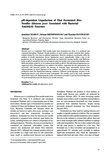Khanom jeen is traditional Thai rice noodles made from fermented rice flour that are produced and consumed throughout Thailand. Noodle products in local markets usually maintain their quality without rotting for a few days at ambient temperature. However, producers occasionally suffer the problem of noodle liquefaction. Severe liquefaction occurs unpredictably within a day at the production site. In the present study, liquefaction was induced by treating noodles with McIlvaine buffer at pH 6.0 and pH 8.0, but was not induced when the noodles were treated with distilled water, McIlvaine buffer at pH 4.0, or 1% sodium lactate buffer at pH 4.0. This pH-induced liquefaction was suppressed when chloramphenicol was added to the buffers, suggesting that this phenomenon was associated with bacterial growth. An increase in reducing sugar, presumably derived from oligosaccharides by starch digestion in the noodles, was observed in accordance with -amylase production under the liquefaction-inducing conditions. Different starch-digesting enzymes in the liquefaction process were observed using zymography. The noodles used in this study contained about 0.03% lactic acid. Maintaining the acidic environment in noodles to prevent bacterial digestion of starch should help retain the khanom jeen noodle structure.

